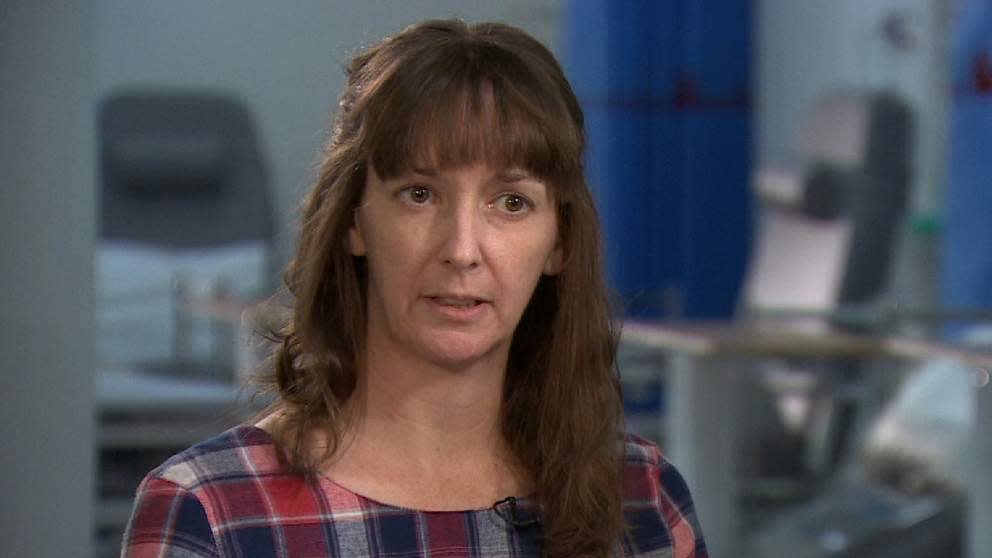British Nurse Pauline Cafferkey Now 'Critically Ill' After Her Ebola Relapse Worsens

(Photo: Sky News Video)
A British nurse who recovered from Ebola last year but was hospitalized late last week after the disease relapsed, has been downgraded from “serious” to “critically ill” after her condition deteriorated.
A statement from the Royal Free Hospital in London, where Cafferkey was flown from her home in Glasglow, Scotland on Friday, said:
"We are sad to announce that Pauline Cafferkey’s condition has deteriorated and she is now critically ill. She is being treated for Ebola in the high level isolation unit at the Royal Free Hospital.”
Cafferkey was flown from her home in Scotland to a London hospital early Friday, where she is being treated in an isolation unit.
Officials say it’s unlikely that Cafferkey will transmit the virus to others, but they are monitoring 58 close contacts of the nurse — a mixture of friends, family and healthcare workers — with 40 of those offered vaccinations as a precaution, according to the Belfast Telegraph.
Cafferkey was first diagnosed with Ebola last December after returning from volunteer work in Sierra Leone, and spent nearly a month in the same isolation unit she’s currently in at Royal Free.
While it’s unusual for Ebola to resurface in a patient, it has happened in the recent past. Ebola survivor Ian Crozier, MD, made headlines in May after one of his eyes changed color two months after he recovered from the disease. Upon examination, doctors discovered that his eye was “teeming” with Ebola.
Crozier’s and Cafferkey’s situations are rare, but board-certified infectious disease specialist Amesh A. Adalja, MD, an assistant professor at the University of Pittsburgh Medical Center, tells Yahoo Health that experts have discovered that there are lingering — and often serious — symptoms from the disease for survivors.
Related: Experimental Ebola Vaccine Could Stop Virus in West Africa
“We’re just beginning to learn the long-term effects of Ebola,” Adalja says. “But we’re seeing it more and more.”
Patients may be left with muscle aches and pain, eye problems, ringing in the ears, and hearing loss after recovering from the disease, Adalja says.
Crozier has suffered from those symptoms, as well as seizures, which he detailed in a speech last Wednesday. “It ain’t over, even when it’s over,” he said, per Live Science. Crozier also said that his vision has improved, but it’s still not back to where it was before his illness.
Eye issues can be particularly problematic for Ebola patients because, experts have discovered, eyes may be what Adalja calls a “sanctuary site,” meaning the virus can thrive there, even after the acute symptoms of the virus have passed.
Cafferkey’s family says that doctors “missed a big opportunity” to spot she had fallen ill with Ebola again.
Cafferkey’s sister, Toni Cafferkey, told the Belfast Telegraph that said the way she had been treated was “absolutely diabolical”. She said Ms Cafferkey had gone to a GP out-of-hours clinic at the Victoria Hospital in Glasgow on Monday night but the doctor who assessed her diagnosed a virus and sent her home.
Ebola sufferers may have some relief in the form of medicines like anti-inflammatories and steroids to treat their particular symptoms, but the after-effects of the disease can linger and become life-altering.
Says Adalja, “They may go away over time, but they can be chronic and debilitating.”
Ebola, a deadly disease caused by infection with a strain of the Ebola virus, dominated international news last year into early spring. The disease spreads through human-to-human or surface-to-human transmission (from bedding, clothing, etc.) via direct contact with blood or bodily fluids.
The 2014 Ebola epidemic, which impacted several countries in West Africa and even surfaced in the U.S., was the largest in history, according to the Centers for Disease Control and Prevention. The epidemic killed more than 11,200 people in West Africa.
Read This Next: How a Tick Bite Left This Woman a Quadruple Amputee

